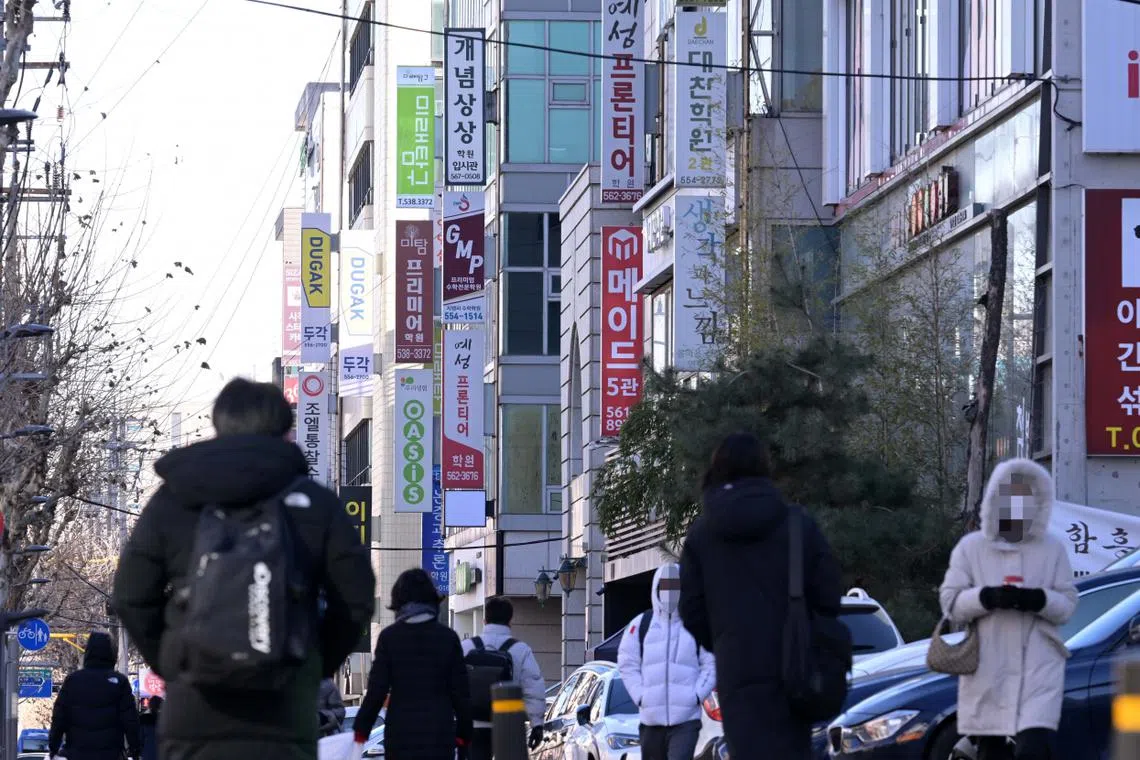$1k per tuition subject: S. Korea’s ‘Daechi mums’ go all out to put their kids in elite schools
Sign up now: Get insights on Asia's fast-moving developments

Buildings covered with signboards belonging to private academies, locally called hagwon, in Daechi-dong, Seoul.
PHOTO: THE KOREA HERALD/ASIA NEWS NETWORK
Follow topic:
SEOUL - After over two decades of climbing the corporate ladder, Ms Park, a 48-year-old who wished to be identified only by her surname, resigned from an executive role two years ago to be a stay-at-home mom.
The reason was simple: to micromanage her then middle-school and 10th-grade daughters through the cut-throat educational landscape of Daechi-dong, a neighbourhood in Seoul’s posh Gangnam district.
“It’s where Sky Castle takes place. Mums give up time and money to send kids to prominent universities starting from elementary school,” Ms Park said, referring to the Korean television drama that centres on the country’s overheated education system
“Some families even move to Daechi-dong only for educational purposes – that’s how obsessed mums are.”
Daechi-dong has been considered the epicentre of South Korean parents’ passion over their children’s education. It is home to thousands of private academies, or hagwon, that provide tailor-made lessons and boast of the nation’s best teachers in each speciality.
Here, mothers share the same goal regardless of socioeconomic status: wrap up 12 years of schooling with entrance to a prestigious university.
Ms Park shares that she quit her job out of “working-mum guilt”, for not being able to pay enough attention to her daughters’ education. For years, she used to think she would never be one of the “Daechi mums” who ditch their careers for their children, as her corporate life mattered too.
As her daughters grew up and started to face the reality of admission competition, however, she said her pride as an executive in the male-dominated business world faded each time she saw her children struggling with their studies.
And now, as a full-time mother, her schedule is her children’s schedule.
She wakes up at 6.30am to take her kids to school and does housework in the morning. In the afternoon, she prepares their meals when they return home, drops them off at a hagwon at around 4pm or 5pm and picks them up again at 10pm. During summer and winter breaks, she drives her daughters to a hagwon where they take special courses. Her day ends after her daughters go to sleep.
The chances of children enrolling at top-level universities are low if their mothers are not next to them, according to Mr Park In-yeon, an instructor at EBS and head of a local educational academy. Besides educating them, mothers also have to craft a good college admissions portfolio, he added.
“Since many Daechi-dong mums are helicopter mums who are overly focused on their children’s education, mums tend to choose their children over work,” Mr Park said.
While some mothers vie for the nation’s most sought-after universities, others eye universities abroad.
Ms Kim Eun-hye, a mother of three, sends her eldest child to an international school on Jeju Island to set her up for a promising future.
“I think the education craze stems from wanting my kids to be successful. Letting go of that desire isn’t easy because I’m afraid my kids will be left out in Daechi-dong’s competitive society,” she said.
That desire also comes at quite a cost, according to Ms Kim. The monthly tuition fee per subject at a hagwon is around 1 million won (S$1,030) for high schoolers and about 3 million won for academically struggling students with tutors – nearly equivalent to annual tuition fees at international schools.
Although a child’s academic success is not guaranteed, psychology professor Lim Myung-ho of Dankook University says children are a key source of life satisfaction for mothers.
“A child’s academic success – a goal for many mothers – is an element that can make mothers feel accomplished for what they’ve done. It’s also compensation they want from their kids for sacrificing their careers,” Professor Lim said.
The satisfaction level reaches its pinnacle when children enter college, but Prof Lim pointed out that empty nest syndrome can await afterwards.
Sociology professor Huh Chang-deog of Yeungnam University views women exiting the workplace to support their children’s education as a societal loss.
“Before being called somebody’s mum, mothers have their own lives as women and career women. Is sacrificing their jobs for kids a wise decision? I don’t think so,” he said. THE KOREA HERALD/ASIA NEWS NETWORK

